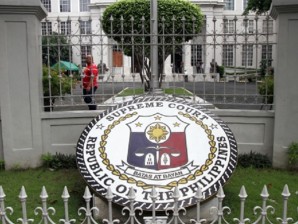The Roman Catholic Archdiocese of Manila has failed to stop the government plan to take over a four-hectare property in Obando, Bulacan, that the Department of Environment and Natural Resources (DENR) found to be part of public domain.
The Supreme Court, in a decision dated Nov. 12, reversed the Court of Appeals’ grant of a motion to dismiss sought by the archdiocese and ordered the Malolos City Regional Trial Court (RTC) to proceed with the case.
The archdiocese claimed the RTC had no jurisdiction over the case filed by the DENR-Region III office since the Church ownership of the land was affirmed by the Court of First Instance (CFI) of Bulacan in 1915.
The archdiocese pointed out that the government, in pushing for the reversion of the land to public ownership, was actually annulling the CFI’s judgment.
The Supreme Court’s Second Division—chaired by Justice Antonio Carpio with Justices Estela Perlas Bernabe, Arturo Brion, Mariano del Castillo and Jose Perez as members—were unanimous that the RTC did not commit a grave abuse of discretion.
“The RTC may properly take cognizance of reversion suits which do not call for an annulment of judgment [of a land registration case]. Actions for cancellation of title and reversion … fall under the jurisdiction of the RTC. Consequently, no grave abuse of discretion can be attributed to the RTC in denying [the archdiocese’s] motion to dismiss,” the Supreme Court said in the decision penned by Bernabe.
In January 2007, the DENR filed in the Malolos RTC a civil case for the cancellation of titles and reversion against several defendants, including the archdiocese which appeared to be the registered owner of the eight parcels of land with a total area of 3.979 hectares in Barangay Panghulo, Obando.
The original certificate of title for the land was issued in November 1917 by the Bulacan register of deeds upon the order of the then General Land Registration Office, which cited the September 1915 CFI decision.
The lots were sold in 1934 to other defendants by the archdiocese, which could be held liable for selling land it did not own if the civil case pushes through.
The DENR, in its complaint, said the 1915 decision did not pertain to the eight lots. The eight lots were the same lots that were part of the “unclassified lands of public domain” certified to by the Bureau of Forest Development in 1983, but declared alienable and disposable the following year.
Obando was part of the Manila archdiocese until 1961, when the diocese of Malolos covering the entire province of Bulacan was created. The lots in question are now a residential area, and the association of the current occupants, Samahang Kabuhayang San Lorenzo KKK Inc., was admitted by the RTC as a party-intervenor in the case.
During the pretrial, the archdiocese filed a motion to dismiss, questioning the jurisdiction of the RTC over the complaint. It alleged that the action for reversion of title was essentially one for annulment of judgment of the CFI, acting as a land registration court, hence beyond the competence of the RTC to act upon.
In January 2009, however, the RTC denied the archdiocese’s motion, saying it was premature. The RTC said it still needed to find out first what the basis of the CFI’s original 1915 decision was and whether it contravened earlier decisions. The lower court found that another case, decided in December 1914, awarded the lots to the archdiocese.
The archdiocese elevated the matter to the Court of Appeals, which in 2010 granted its motion to dismiss. The DENR appealed to the Supreme Court.
